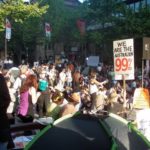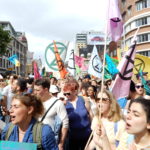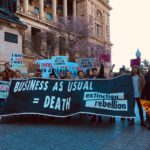Rebellion Is Our Moral Duty: An Interview With Extinction Rebellion’s Larissa Payne
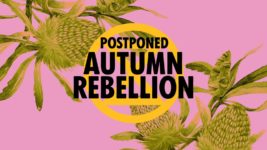
In mid-April last year, masses of climate activists shutdown major parts of London for over a week. Those involved in the nonviolent direct actions rallied under the banner of Extinction Rebellion (XR), which is a movement that was then relatively unknown in Australia, but today, is a household name.
Not only has awareness of XR grown, but the general understanding that the earth is facing a climate emergency has too. And if you speak to seasoned activists, they’ll tell you that the XR movement has played an integral role in making that knowledge commonplace.
And it’s not just the high visibility acts of civil disobedience – along with participants willing to put their liberty on the line – that has made Extinction Rebellion a formidable force of change, it’s also the activist community that it’s established.
If you peruse the list of events on the Extinction Rebellion Australia Facebook page, they’re not just notifications about protests, but there are notices regarding induction workshops, nonviolent direct action training, market stalls, second hand clothes swaps and choir practice.
XR demands
Extinction Rebellion has three key demands. The first is that governments begin to tell the truth by declaring that there’s a climate and ecological emergency. And since XR started mobilising in this country, literally dozens of local councils have done this.
The second demand is that governments act now in order to stop global warming before the consequences get worse than they’re already going to be. Extinction Rebellion wants to see changes implemented that allow greenhouse gases to be cut to net zero by 2025.
And the final demand is that governments establish People’s Assemblies on climate and ecological justice, which would involve members of the public advising governments on climate policy, as obviously, politicians are somewhat lacking in this department.
One sign of just how influential Extinction Rebellion has been in regard to the wider Australian climate movement is that the huge People’s Climate Assembly rally in Canberra in February not only involved XR, but it was directly inspired by the group’s demands.
The “social contract is broken”
Of course, another major reason why action on climate has become imperative to a majority of Australians is that the country just suffered a bushfire crisis of a magnitude that’s never been seen before.
However, in the immediate aftermath of the climate-related catastrophe, the Morrison government has continued to make fossil fuel expansion decisions, which shows just how necessary it is for citizens to join movements like XR to bring about the necessary changes to save life on Earth.
Sydney Criminal Lawyers spoke to Extinction Rebellion Australia spokesperson Larissa Payne about why the movement has been so successful, the way it’s developed over the last six months, and her belief that the whole democratic system needs an overhaul to prevent further rises in temperature.
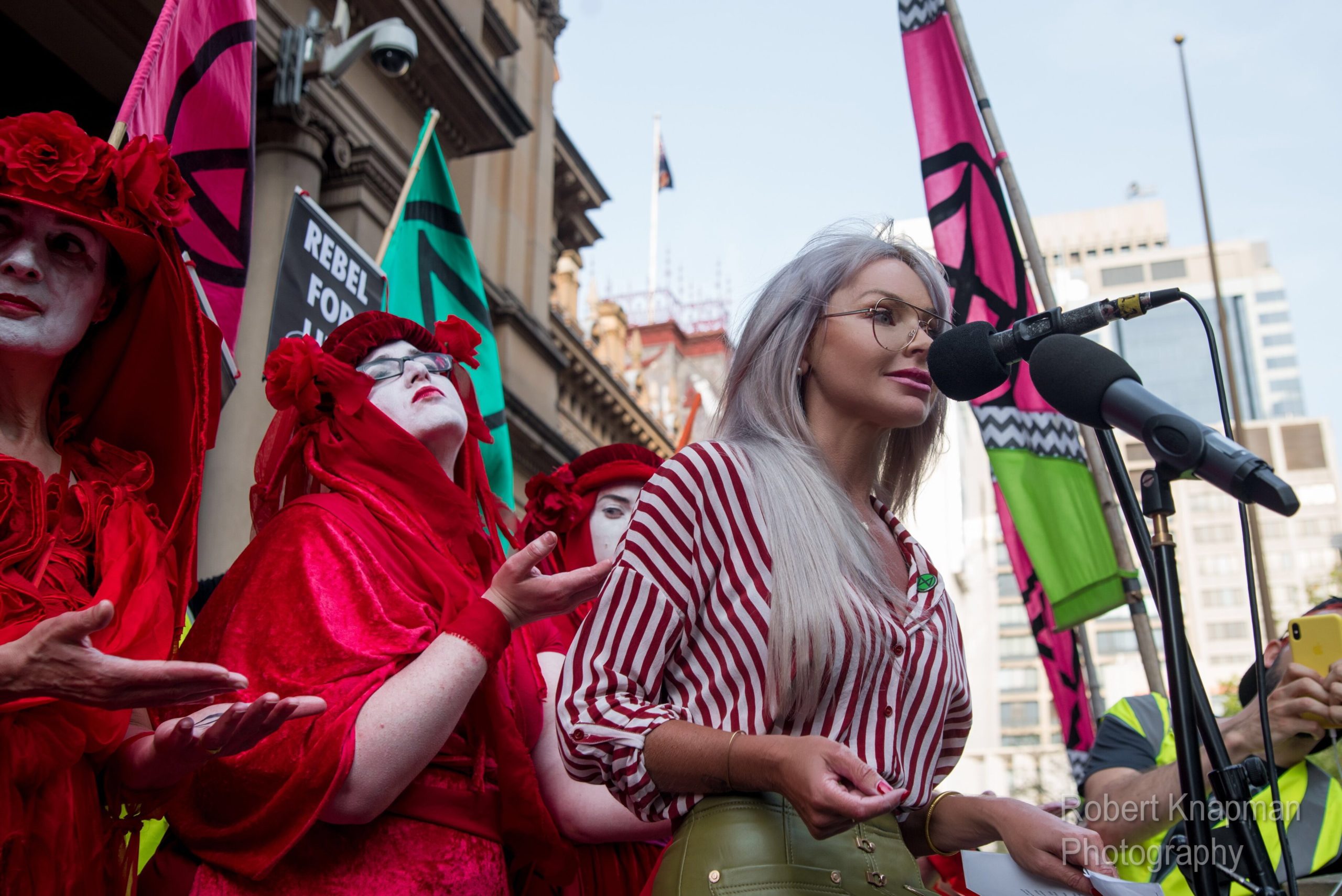
Firstly, we last spoke about Extinction Rebellion in August. Since then, there have been significant developments in the area of changing climate. None more so than the months-long bushfire crisis. Larissa, what did the bushfire crisis tell us about the state of changing climate right now?
In terms of the state of changing climate right now, it is exactly that – climate change is here, and it is now. Climate change has shown its apocalyptic face in choking our cities and obliterating small towns and economies – basically, turning the country into char and cinder.
And this has left a rich and developed country wondering why the hell we were so ill prepared, especially when the government has been repeatedly warned by its scientists, First Nations people and fire chiefs.
The bushfires showed us that climate change isn’t just an ecological issue, but a social one, where communities experience signs of social collapse.
So that’s no comms, no power, empty supermarket shelves and climate refugees. And this has all come with just 1°C of heating.
Scientists have admitted that they’ve underrated the pace at which climate change would arrive. In 1990, the IPCC’s first report said that it would arrive at a stately pace.
But, that’s frighteningly inaccurate. Its rapidity is undeniable. And it’s accelerated when we’ve experienced tipping points and manmade alterations, like the possibility of the Amazon changing from a carbon sink to a carbon source, instead of remaining the world’s lungs.
The bushfires emitted 400 million tonnes of CO2, which according to the Global Fire Emissions Database will double Australia’s annual emissions from burning fossil fuels. And NASA announced that the smoke circumnavigated the globe.
So, if the bushfires told us anything about changing climate, it’s that we’ve run out of time to sit on our hands, there’s no debate and the evidence is in. We must act now or risk offering an uninhabitable and unsustainable planetary inheritance to our kids.
And what sort of impact would you say the crisis had on the community?
It made the climate emergency a tangible reality for people across all social strata and partisan persuasions.
We know that the majority of Australians had already accepted the climate science, but the urgency was another thing.
People who weren’t connecting to polar caps melting six times faster than the 90s, suddenly connected to the reality of what 1°C of heating looks like.
Catastrophic fallout and ongoing trauma have pummelled the hearts of the community. It has also given us a glimpse into how strong and inspired we are, when we come together.
It has taught us that there is power in the community, and that we cannot rely on the government to save us.
The fires showed us first hand how ill prepared and dismissive the government is of the science, First Nations land management expertise and our Rural Fire Service. People were appalled.
We had no choice but to hold hands and organise across regional centres and city suburbs, with essential item donations for fire-affected communities, fundraisers, billeting for climate refugees and, of course, protests.
There were 40,000 people at Sydney Town Hall on 10 January. And that’s ordinary people, not just activists. The ambience was thick with rage and despair as well as unity and community – the momentum was potent.
I spoke at that rally and one of the things that roused the most response was demanding that the government act on the findings of a People’s Assembly on climate and ecological justice. That’s mini-public that would be informed, fair, transparent and nonpartisan.
A People’s Assembly representing the community would make decisions pertaining to the climate and ecological emergency, which would mean the government listens to us.
People didn’t just cheer, they roared. Communities want to be heard. They want the government to listen. And since the fires, more than ever.
There’s also been a shift within activism. People that are doing wonderful work that focuses on localised initiatives, like plastic-free living, have been radicalised into at least supporting more drastic action.
So, while these individual lifestyle choices are valuable, they are not going to save the planet, and people are starting to realise this.
Of course, it’s given XR more social licence, even within circles within more staid activism. The community realises that climate change is manifesting now, and that action has to happen.

When we last spoke XR was still a relatively new phenomena in this country. How has the movement developed since then?
Extinction Rebellion is a living, moving organism. We’re constantly reflecting and responding to the political weather, which means it’s inevitable that we develop internally and strategically.
While we’ve grown in number, we’ve also grown in our organising. It’s definitely becoming more refined and well-oiled.
While some of us have been in activism for many years, many are brand new to activism. The last six months has seen some of the most fresh-faced activists become some of the most inspiring and clever organisers.
We’ve also embraced SOS, which is a well-designed self-organising system. It respects decentralised organising with no hierarchy. But, it allows for lateral roles with mandates. That empowers organisers with coordinating roles and working groups to make fast and effective decisions.
One of the ways that we challenge this toxic system is by building solidarity with communities. We’ve been listening to First Nations elders, learning from them and taking direction.
I’ve spoken to a lot of people over the last six months who’ve noted that Extinction Rebellion has really put the climate crisis front and centre. How would you describe the impact XR has had upon the public over the last half year?
We’ve helped centre the urgency of the climate conversation and the need for government to tell the truth by declaring a climate emergency.
On a local level, XR has been one of the key drivers for councils declaring climate emergencies. And now it’s part of the parliamentary lexicon, which was one of our goals.
Local councils have listened to XR. They’ve worked with XR. And they are continuing to work with XR. They’re listening to us as concerned community members and taking directions on how they can enact meaningful change that reflects the urgency of the science.
Effectively, they’re modelling pathways that state and federal levels could learn from. And they’re starting to have discussions about disrupting business as usual in their own space, and putting pressure on state governments, so they can fairly represent the concerns of the community.
Just last week, XR Bondi Beach and Sydney’s East met with Waverley mayor Paula Masselos and deputy mayor Elaine Keenan to discuss how the council can go forward now that they’ve declared a climate and biodiversity emergency. Six months ago, most councils didn’t know who XR was.
We’ve also brought nonviolent civil disobedience into the foreground. People are still unpacking what that is and what it means, but many understand how vital it is in forcing change.
Christiana Figueres, the former UN chief who led the negotiations for the Paris Agreement, has recently endorsed Extinction Rebellion. She has called for nonviolent civil disobedience
Figueres said that civil disobedience is not only a moral choice, but the most powerful way of shaping world politics. And she identified how few systemic political shifts have occurred without it.
We’ve got a long way to go. And we see ourselves as just one pocket within a broader movement. But in building the movement, connecting with allies and walking together – as Uncle Greg and Uncle Kevin have directed – we’ll hope to have an impact.
Long-term activist Stephen Langford remarked that what XR has done that a lot of other activist groups still lack, is it’s built up a sense of community within the movement. Can you speak a bit on the solidarity the group has built amongst people from differing backgrounds?
Climate justice is part of the fabric that is Extinction Rebellion. That means that solidarity with people from all backgrounds isn’t an option, it’s imperative.
The system responsible for the climate crisis is the same system responsible for injustice experienced by First Nations people and all varieties of class, race and gender injustice. XR challenges this toxic system. This is one of our values and principles.
One of the ways that we challenge this toxic system is by building solidarity with communities. We’ve been listening to the wisdom and leadership of various First Nations communities and elders.
Aboriginal people have been in this fight for 250 years and know country better than anyone. So we’ve participated in indigenous-led healing vigils in the city and accepted an invitation for a contingent at this year’s Invasion Day rally.
We also had a camp space at the Aboriginal Tent Embassy for a People’s Climate Assembly, as well as ongoing collaboration with the tent embassy.
We’re responding to Uncle Kevin, Uncle Greg, Aunty Jacinta and other’s insistence that we walk together. That’s become one of our main focuses.
XR Australia began in the CBDs of Melbourne and Sydney, so initially, we weren’t as accessible to all communities as we wanted to be. But, this is changing as we build capacity to expand into regional communities.
XR Western Sydney is evolving and doing wonderful things with communities in that region. Similarly, regional chapters have formed from the Blue Mountains to the Northern Rivers.
We’ve organised closely with chapters on all continents from XR Gambia to XR Sri Lanka, XR Chile to XR Turkey.
In January, we coordinated the Bushfire Rebellion which saw protests outside Australian embassies in more than 50 countries.
As Carl Sagan said, carbon molecules don’t have passports. Raising the alarm on the climate emergency really is a borderless fight for existence.
People around the world mobilised in solidarity when we were ravaged by those fires. It was a beautiful moment and a peak at how community can cross borders and intersections.
XR can’t achieve its demands without it being inclusive of all communities that will be and are being affected by the climate crisis. We’re in this together.
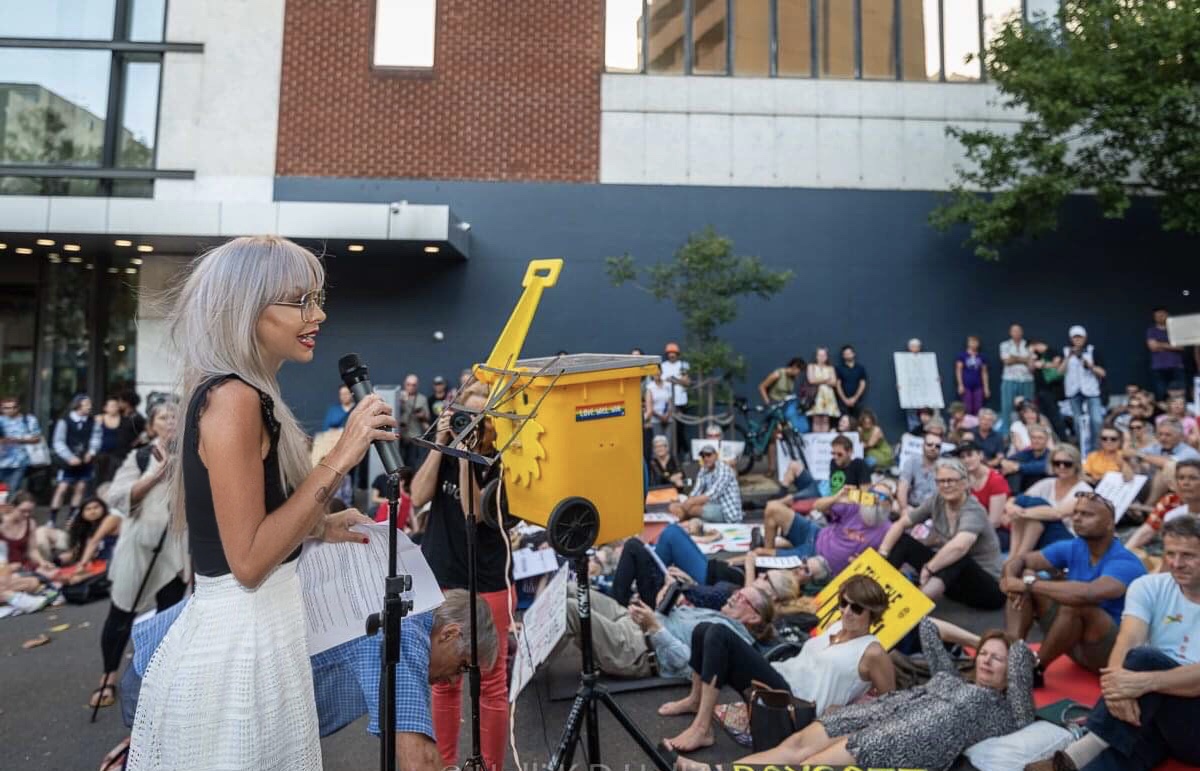
Last October’s week-long Spring Rebellion caused a stir and grabbed a lot of headlines. And I see that planning is underway for the XR Autumn Rebellion, which starts on 2 May. What should people be expecting at the time?
XR values human life, so we’re responding to COVID by postponing Autumn Rebellion. It will still happen, we’re just not sure of the date yet.
When we’ve decided on the new date, people can expect strategised, creative actions that will disrupt business as usual, build community or embrace the regenerative culture we so need to get through this crisis.
There will be momentum and there will be parties. There will be satire and there will be colour.
We learnt a lot from last October and this will be reflected in the actions that we’ve got planned. Almost all actions will be publicised, and we encourage anyone who wants climate action now to join us. And if they can’t, we hope they will support us.
We ask the community to remember that we are doing this for their children and grandchildren. So, when we say rebel for life, we mean it literally.
Any disruption that we cause to draw attention to acting now on the climate emergency, pales in comparison to the destruction the climate emergency will cause, or, as the bushfires taught us, has caused.
Extinction Rebellion is an ongoing movement with long-term goals. How would you sum up what the movement is aiming for beyond the Autumn Rebellion?
We’re in this for the long run. A lot of groups organise around election cycles, and while this is part of XR’s strategy, we are not defined by it, and we are definitely not reliant on it.
Beyond Autumn Rebellion, we will continue to build scale and organise, even if there’s a positive shift in the political dynamic.
We say that no action is over until the last arrestee’s fine is paid, so similarly, XR will not stop organising until climate justice is achieved for all people on all continents.
We will be researching and developing more around crisis complicit industries and how we can target them in ways to create wedges between them and government. That includes media, banks and superfunds.
Inspired by Hong Kong, we aim to be like water. We will shift, change, flood or retreat, according to the political weather.
What we won’t do is go away.
Of course, then we have the Morrison government. While the bushfires still continued, it returned to parliament and appointed a new resource minister, who’s calling for more investment in coal, gas and uranium, while the PM cut a new gas deal with the Berejiklian government.
How can we account for the government of a country that had just seen over 20 percent of its forest burn, directly returning to parliament to make these sorts of decisions?
We can’t. They’ve proven their utter inability to provide for the communities they’ve been elected to represent, as well as their inability to govern.
Their blatant disregard for people and planet – even at the peak of the bushfires – is so audacious that the only plausible practical outcome is that they’ve got to go. And by go, I don’t mean replaced with a less shitty, but still shitty team.
The entire system’s social contract is broken. And that’s why we rebel. Our democracy needs to be reimagined, replenished and rebuilt.
And lastly, Larissa, there’s been a lot of criticism of the federal government’s approach to the coronavirus, but, if anything, there has been a sense of urgency about it. And it is strategising and making constant announcements to the public.
But, while COVID-19 is likely to blow over in a number of months, the climate challenges we’re facing are just going to get worse and the government, for the most part, is completely ignoring the issue.
How long do you think the government can continue to disregard the crisis and community calls for climate action?
As long as the revolving door between the government and the fossil fuel cartels remains, they’re likely to disregard the crisis, or at least package a Clayton’s response to deceive or pacify the community.
This is why nonviolent civil disobedience is necessary.
As long as there’s inadequate action from governments, civil disobedience will increase. As Christiana Figueres said, it’s our moral obligation.
While I have no faith in government, I do have faith in community.
Martin Luther King said it best, “I believe that unarmed truth and unconditional love will have the final word in reality. This is why right, temporarily defeated, is stronger than evil triumphant.”



